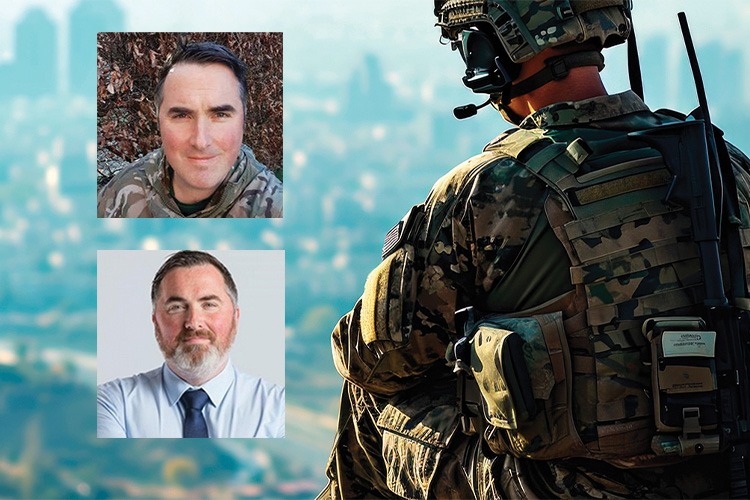An unexpected transition: soldier to civilian in the security sector
How can service personnel leaving the forces and entering the civilian job market transfer their skills and competencies to build a strong foundation for a civilian career?
I was a Late Entry Officer in the Army, in command of a specialist unit providing counterintelligence capabilities in the UK and around the world, and then, overnight, I wasn’t.
Leaving the Army felt like an uncharted journey, a leap into the unknown that I was not fully prepared for. My medical retirement came as a shock, disrupting a life I had committed to for over 26 years. I didn’t want to leave the camaraderie, the structure, and the sense of purpose that came with military service. This transition was thrust upon me, and without sufficient preparation, I found myself confronting the significant challenges of civilian life.
The military had equipped me with a unique set of skills, yet in the civilian job market, these competencies often felt too specific — almost niche in a way that couldn’t translate into civilian life. Despite my years of experience, translating my military accomplishments into a language that resonated in the civilian world proved daunting, a regular challenge for service personnel leaving the forces. I had no formal qualifications that aligned with industry standards; the accolades and certifications I earned in the Army didn’t hold much weight outside its confines.
However, I was fortunate to stumble upon opportunities in the security industry, specifically with Global Protect and LMS Security, who as a Group, wanted to leverage my skills and experience in specialist security and Technical Surveillance Counter Measures (TSCM) in a commercial environment. This became a pivotal point in my life — a chance to not only find employment but also to work alongside brilliant individuals who shared their insights and experiences. It was this collaborative environment that ignited my passion as a civilian security professional, a field I had never envisioned myself in.
Initially, I felt woefully underprepared.
Diving into the intricacies of security protocols, risk assessments, and client interaction, demanded an entirely new skill set. However, I was able to draw on the experience of my operational tours; they had instilled in me lessons of leadership, adaptability, and critical thinking.
Understanding that the stakes were often high in both military and security contexts, I began to see parallels between my past and new life in the security industry. My ability to remain calm under pressure, to think strategically, and to manage teams in stressful situations became highly relevant.
Yet, none of this would have been possible without the incredible support of my new colleagues. They didn’t just help me understand the security landscape — they helped me realise the relevance of my military experience in this new context.
By acknowledging that I needed assistance, I was able to build relationships that became the foundation of my new career. I learned to lean on their expertise, to draw from their diverse perspectives, and to fuse these insights with my military background.
My experience taught me the significance of resilience and the importance of asking for help. Two years ago, I would tell myself to prepare for this transition. I wish I had invested time in developing a strong CV long before my retirement loomed, documenting not only my military roles but also the transferable skills I possessed.
Education is paramount; I should have taken the initiative to pursue relevant courses and certifications while still in service, establishing a strong foundation for my civilian career. The past two years have been transformative. I have replaced the familiar faces of soldiers with the remarkable individuals in my team. They are not just a group of colleagues; they are a diverse mix of experiences and ideas. Each person brings something unique to the table, fostering an environment where innovation thrives. This diverse team has inspired me to continue learning, challenging me to grow every day and reshape my understanding of security.
Reflecting on my journey, I have realised that while my transition from military to civilian life was not something I consciously chose, it has opened up new horizons I never anticipated. The skills I honed in the Army — leadership, strategic planning, and crisis management — are instrumental in my role today. I am not just existing in a new career; I am relishing it, committed to learning new lessons from the brilliant people in our diverse and iterative industry.
In conclusion, my advice for veterans who might find themselves in a similar situation is straightforward: prepare for the transition early. Invest in learning and education, explore industries that pique your interest, and most importantly, surround yourself with brilliant people who can guide and inspire you. Embrace the unknown with an open mind, knowing that every skill you possess has the potential to be valuable in unforeseen ways. The transition may be challenging, but with the right approach and a strong support system, it can lead to a fulfilling new chapter, rich with opportunity and growth.
Matt McGinn
Managing Director
Global Protect and LMS Security



